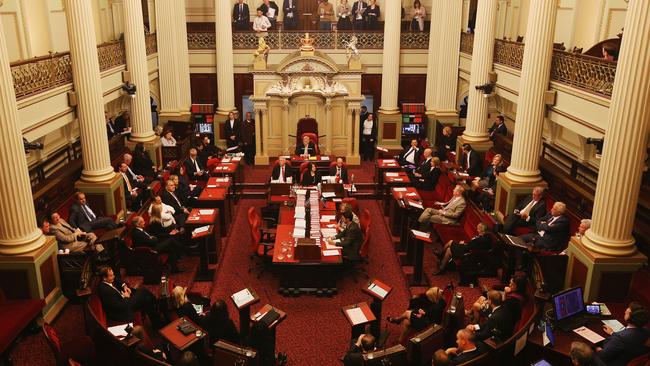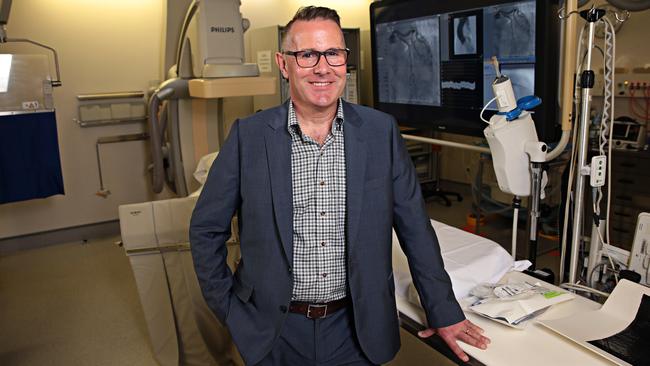We must never deny the sick a dignified death
Voluntary Assisted Dying laws come into effect on Wednesday and the terminally ill should not have barriers put in their way, writes Susie O’Brien.

Susie O'Brien
Don't miss out on the headlines from Susie O'Brien. Followed categories will be added to My News.
From Wednesday, terminally ill patients who have only months to live will have access to a lethal drug to end their life. Already, dozens of Victorians are quietly getting themselves organised to ensure they have a legal, dignified death.
What’s going to happen to those who are treated in Victoria’s 26 Catholic hospitals and 89 aged care, hospice and palliative care facilities? Those faith-based healthcare providers are declining to either “provide or facilitate” Voluntary Assisted Dying even when it becomes legal on Wednesday.
I don’t support the conscientious objector loophole in the legislation that allows such organisations to opt-out, but accept it was crucial in getting the law through parliament.

I am worried, however, that Catholic organisations will foster a culture that will encourage their staff to hamper the right of their patients to access lethal VAD drugs from other doctors.
Even though the law is imminent, Catholic providers are still stressing their faith in palliative care. So it’s reasonable to expect there will be some pressure on individual doctors to push this approach rather than refer patients to doctors who support VAD. This is most unfair for those who are experiencing suffering that cannot be relieved in a way they find tolerable.
The vehemence of the Catholic hospital’s opposition to VAD is continuing, so why should we have faith they would help people access their legal rights?
The Catholic Archdiocese of Melbourne’s “We Care” document, prepared in light of the law’s passing, states that “euthanasia or assisted suicide are never part of end of life care”.
It offers three ways those who conscientiously object to the law can “accompany people who suffer”. These include prayer and providing information such as getting them to read the Catechism. This will be cold comfort for nonbelievers.
“We may not be able to change the law now, but we can remove the need for it and resist it by refusing to co-operate with it,” the document states.

“Despite what the law may say, our Christian tradition affirms that every life, including those of the sick and suffering, is sacred. For us, euthanasia or physician assisted suicide are never part of end of life care.”
This month St Vincent’s Health CEO Toby Hall said people wanting euthanasia won’t be turned away and his staff “will not impede access” to the provision of VAD elsewhere. And yet the same statement continues to stress opposition to euthanasia and says his staff will not “provide or facilitate it”.
The law says nonparticipating hospitals must not “impede” but that doesn’t mean they will help. And it doesn’t mean patients won’t be pressured into accepting palliative care as an alternative option providing them with a “good death”.
Hugh Sarjeant, president of the Dying with Dignity Victoria board, says many conscientious-objector doctors will say they don’t know who to refer people to. That is because only about 100 doctors across the state have done the training so far and a list of their names has not been made public.

That doesn’t mean 100 doctors will be on hand to help eligible patients. Some have done the training to help their own patients, but won’t see referrals from other clinicians they don’t know. Dignity with Dying lobbyists want even objectors to do the training so they can better understand their role.
Mr Sarjeant hopes GPs or specialists will refer patients to his office, where trained staff will help them access a medical provider who meets the criteria of the legislation. But there is no obligation on clinicians to do so.
At this stage, the idea that terminally ill patients will be seamlessly referred on by conscious-objector doctors is not a reality, either in moral or practical terms.
There is no formal service linking patients and qualified doctors except two “Navigation Care” nurses for the whole state.
The objection clause will mean some desperate terminally ill patients at the end of their life will have to change doctors, hospitals or aged care homes in order access their legal right to VAD. Having been through the end-of-life stage with my father and father-in-law earlier this year, I know the wrench that would be.

Some patients are already taking steps to obtain assessment for VAD by going to see their current Catholic doctors in the private rooms to get the lethal medication. The experience of patients in other countries shows us some will need to discretely transport their lethal medication in a locked box, take day leave or organise for a visiting clinician to fulfil their wishes.
MORE: 100 VICTORIANS PUT UP HANDS TO DI E
Patients should not have to go through such mechanisms in order to die with dignity in this state. Trained doctors, regardless of their employer’s faith, are free to privately provide VAD to anyone who meets the criteria.
They would know that having the comfort of a dignified death is one of most important touchstones of a dignified life.
Susie O’Brien is a Herald Sun columnist.


